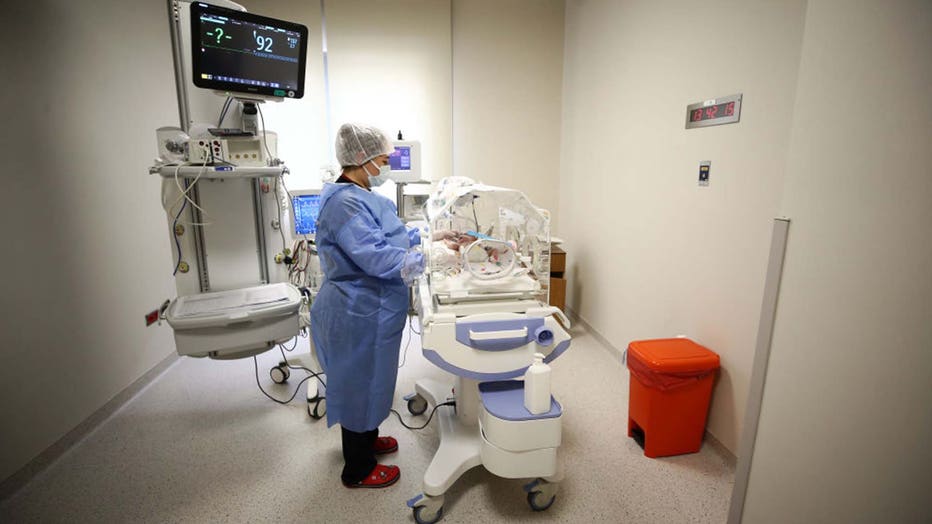FDA expands emergency use of 2 COVID-19 monoclonal antibody treatments to infants
The U.S. Food and Drug Administration has expanded emergency use of two approved monoclonal antibody treatments for COVID-19 to include infants and newborns who have tested positive for the coronavirus and are at high risk for severe COVID-19, the agency announced on Friday.
The FDA revised its emergency use authorization guidelines for bamlanivimab and etesevimab, which previously only included children ages 12 and older.
"This revision also authorizes bamlanivimab and etesevimab, to be administered together, for post-exposure prophylaxis for prevention of COVID-19 in all pediatric patients, including newborns, at high risk of progression to severe COVID-19, including hospitalization or death.," the FDA said.
"Now all patients at high risk of severe COVID-19, including children and newborn babies, have an option for treatment and post-exposure prevention. Children under one year of age who are exposed to the virus that causes COVID-19 may be at particularly high risk for severe COVID-19 and this authorization addresses the medical needs of this vulnerable population," Dr. Patrizia Cavazzoni, director of the FDA’s Center for Drug Evaluation and Research, said.
Monoclonal antibodies are proteins made in a lab which copy the human immune system’s ability to fight off harmful pathogens such as the novel coronavirus, according to the FDA.

FILE - A nurse wearing full PPE cares for a newborn infected with COVID-19.
RELATED: Study suggests past COVID-19 infection may not fend off omicron variant
"Bamlanivimab and etesevimab are monoclonal antibodies that are specifically directed against the spike protein of SARS-CoV-2, designed to block the virus’ attachment and entry into human cells," the agency said.
The FDA previously approved both monoclonal antibody treatments for adults and children as young as 12 in February to treat patients with mild to moderate COVID-19 and patients who are at risk for developing severe COVID-19.
A few months later in September, the agency approved the use of bamlanivimab and etesevimab as post-exposure prevention treatments for the novel coronavirus, according to the FDA.
"While today’s authorization includes post-exposure prevention of COVID-19 in children, this therapeutic option is not a substitute for vaccination. Vaccines remain our best tool in the fight against the virus and there is a COVID-19 vaccine authorized for children 5 years of age and above," Cavazzoni added.
The FDA’s expansion of its emergency use authorization of monoclonal antibody treatments to include infants and newborns comes as multiple states in the U.S. confirm several cases of the highly transmissible omicron COVID-19 variant.
RELATED: Pfizer asks FDA to expand emergency use of COVID-19 booster to include 16, 17-year-olds
At least five states have confirmed cases of the omicron strain, showing yet again how mutations of the virus can circumnavigate the globe with speed and ease.
Just a day after the first known U.S. case was found in California, tests showed the omicron variant had infected at least five people in the New York City metropolitan area, plus a man from Minnesota who had attended an anime convention in Manhattan in late November.
A Colorado woman who had recently traveled to southern Africa, a Hawaii resident with no recent travel history, and another California resident who traveled to South Africa last month also were infected by the variant, officials said.
Much remains unknown about omicron, including whether it is more contagious, as some health authorities suspect, whether it can thwart vaccines and whether it makes people as sick as the original strain.
Health officials in each state said there was no cause for undue alarm. But the spread of the cases, some involving people who hadn't been away from home recently, meant the variant was likely already circulating domestically in some parts of the U.S.
RELATED: US to require all inbound travelers to take COVID-19 test 1 day before flight
Meanwhile, the World Health Organization officials said Friday measures used to counter the delta variant should remain the foundation for fighting the coronavirus pandemic, even in the face of the new omicron version of the virus.
"Border control can delay the virus coming in and buy time. But every country and every community must prepare for new surges in cases," Dr. Takeshi Kasai, the WHO regional director for the Western Pacific, told reporters Friday during a virtual news conference from the Philippines. "The positive news in all of this is that none of the information we have currently about omicron suggests we need to change the directions of our response."
That means continuing to push for higher vaccination rates, abiding by social-distancing guidelines, and wearing masks, among other measures, said WHO Regional Emergency Director Dr. Babatunde Olowokure.
He added that health systems must "ensure we are treating the right patients in the right place at the right time, and so therefore ensuring that ICU beds are available, particularly for those who need them."
Kasai warned: "We cannot be complacent."
The Associated Press contributed to this report.


